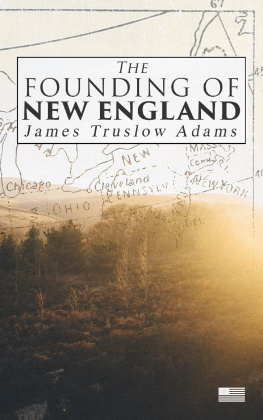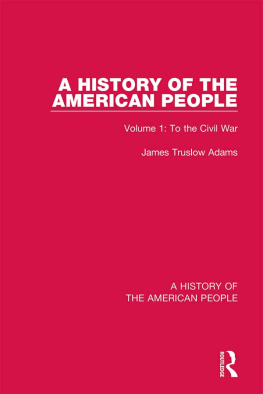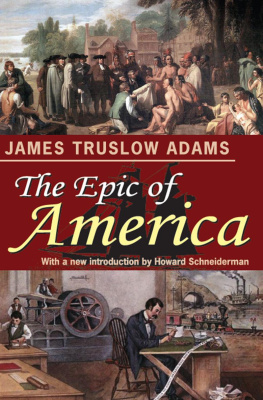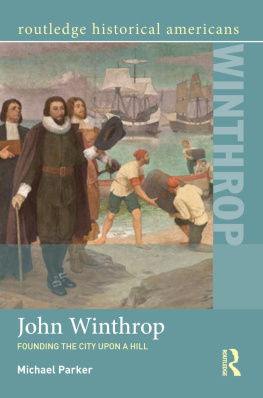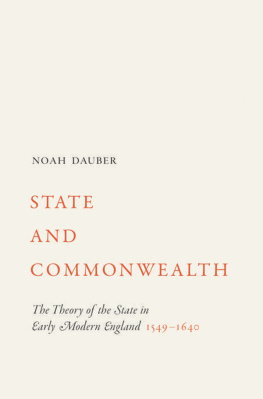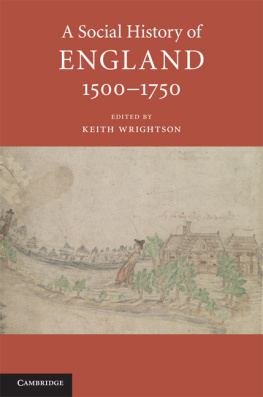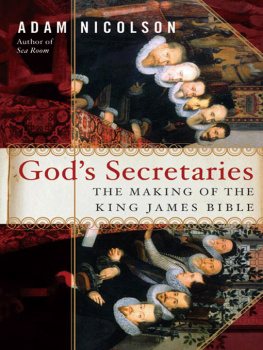PREFACE
The following account of the founding of New England is intended to serve as an introduction to the later history of that section, and to the study of its relations with other portions of the Empire and with the mother-country, as well as of the sections influence upon the nation formed from such of the colonies as subsequently revolted. The book thus necessarily deals mainly with origins, discussing the discovery and first settlement of the region; the genesis of the religious and political ideas which there took root and flourished; the geographic and other factors which shaped its economic development; the beginnings of that English overseas empire, of which it formed a part; and the early formulation of thought-on both sides of the Atlantic-regarding imperial problems.
There is no lack of detailed narratives, both of the entire period covered by the present volume and, on an even larger scale, of certain of its more important or dramatic episodes. New material brought to light within the past decade or two, however, has necessitated a revaluation of many former judgments, as well as changes in selection and emphasis. Moreover, our general accounts do not, for the most part, adequately treat of those economic and imperial relations which are of fundamental importance; for the one outstanding fact concerning any American colony in the colonial period is that it was a dependency, and formed merely a part of a larger and more comprehensive imperial and economic organization.
Consequently, the evolution of such a colony can be viewed correctly only when it is seen against the background of the economic and imperial conditions and theories of the time.
While the author, accordingly, has endeavored to place the local story in its proper imperial setting, he has endeavored also to distinguish between its various elements, and to display the conflicting forces at work in the colonies themselves. The old conception of New England history, according to which that section was considered to have been settled by persecuted religious refugees, devoted to liberty of conscience, who, in the disputes with the mother-country, formed a united mass of liberty-loving patriots unanimously opposed to an unmitigated tyranny, has, happily, for many years, been passing. In his own narrative of the facts, based upon a fresh study of the sources, the author has tried to indicate that economic as well as religious factors played a very considerable part in the great migration during the early settlement period, in the course of which over sixty-five thousand Englishmen left their homes for various parts of the New World, of which number approximately only four thousand were to join the New England churches. He has also endeavored to exhibit the workings of the theocracy, and to show how, in the period treated, the domestic struggle against the tyranny exercised by the more bigoted members of the theocratic party was of greater importance in the history of liberty than the more dramatic contest with the mother-country.
While the local narrative is based wholly upon original records, much use has been made also of the rapidly increasing number of scholarly monographs upon particular topics, the indebtedness to which will be found more particularly set forth in the footnotes. It is true that many pointssuch as land-tenure, in spite of all that has been written upon ityet remain to be cleared up before we can be quite sure that we understand a number of matters connected with colonial institutions. Nevertheless, so much work of this character has already been done, which has only in part found its way into popular accounts, that it seems as if the time had come for a serious attempt to recast the story of early New England, and to combine these results of recent research with the more modern spirit, in a new presentation of the period.
To those who first encouraged him to undertake the work,interrupted by the war,and who, in one way and another, have assisted him in his enterprise, the author takes this opportunity to offer his most sincere and grateful thanks.
J. T. A.
Bridgehampton, New York,
November 9, 1920.
CHAPTER I
THE AMERICAN BACKGROUND
In the name of the country which to-day occupies the major part of the inhabitable portion of North America is indicated the twofold nature of its history; for the story of the United States may evidently be approached, either from the standpoint of a federal nation, or from that of its component political units. These units, although in themselves separate states, are geographically divided from one another, for the most part, by boundaries which are purely artificial. Natural frontiers consist of the sea, deserts, mountains, rivers, and the now almost obsolete ones of forests and swamps. A glance at the map shows that such natural barriers are only a negligible part of the boundaries between our various states and territories. Rivers alone form an exception, and these, for several reasons, are the least satisfactory for the purpose. Were the federal tie dissolved, and these now united commonwealths to become completely independent, and possibly hostile, the artificial character of their limits would at once become obvious.
From this it has followed, as settlement has gradually spread over the continent, bringing innumerable communities into existence, that these have tended to group themselves into sections, united by common modes of thought, ways of life, and economic needs. Histories of the individual states are almost as arbitrarily localized as the histories of the counties within them; but the story of any of the sections into which the country has divided from time to time possesses an organic unity created by the forces of life itself.
Some of these divisions have tended to remain permanent, while others have passed with the development of the country. During the colonial period, when the English inhabited only the comparatively narrow strip of land between the sea and the mountain-barrier of the Appalachian system, the colonists fell into three natural groups,the New England, the Middle, and the Southern,determined by climatic, economic, and cultural conditions. These factors, operating with others somewhat more fortuitous, made the distinctions both lasting and marked, the extreme northern and southern groups exhibiting their differences more clearly than the intermediate one lying between them.
When the frontier was extended west of the mountain-barrier,and, indeed, on a smaller scale, even earlier,another grouping came into existence, that of East and West, or old settlement and frontier. This division was also to persist, with an ever-enlarging East and an ever-retreating West. If the economic and political ideas of these new sections were to remain somewhat sharply contrasted, the distinctions between the original extreme eastern groups were also continued, like lengthening shadows across the mountain ridges, and the whole country was to find itself aligned in two hostile groupings in the most tragic division that it has yet had to facethat between the North and the South.
In the New England group we have one which, in spite of minor differences, is unusually homogeneous. Not only are the boundaries between the six states which now form it negligible, but the section, as a whole, is a geographical unit, within which a common life, based upon generally similar economic, political, and religious foundations, has constituted a distinct cultural strain in the life of the nation. The New England idea and the New England type have been as sharply defined as they have been persistent; and, if, in our own day, they seem, to some extent, to be passing, their influence may be no less living because spread broadcast throughout the whole land, and absorbed into the common national life. Effective natural boundaries, defining a limited area, are of determining influence in fostering the life of primitive peoples or of civilized colonies. Diffusion over an unlimited space, in the one case, tends to weaken the hold on the land and the growth of the state, while, in the other, it greatly retards the development of those elements that make for civilized life. Aside from other factors, the possession by the English, in the settlement period, of a limited and protected area, naturally restricted by the sea and the mountains, resulted, speaking broadly, in the building up of thickly settled, compact colonies as contrasted with the boundless empire of the French, opened to them by their control of the Mississippi and the St. Lawrence rivers. It is noteworthy that, of the great river-highways leading to the interior of the continent,the St. Lawrence, the Hudson-Mohawk, and the Mississippi,none was at first possessed by the English, who had everywhere, unwittingly but fortunately, selected portions of the coast where their natural tendency to expand was temporarily held in check.

